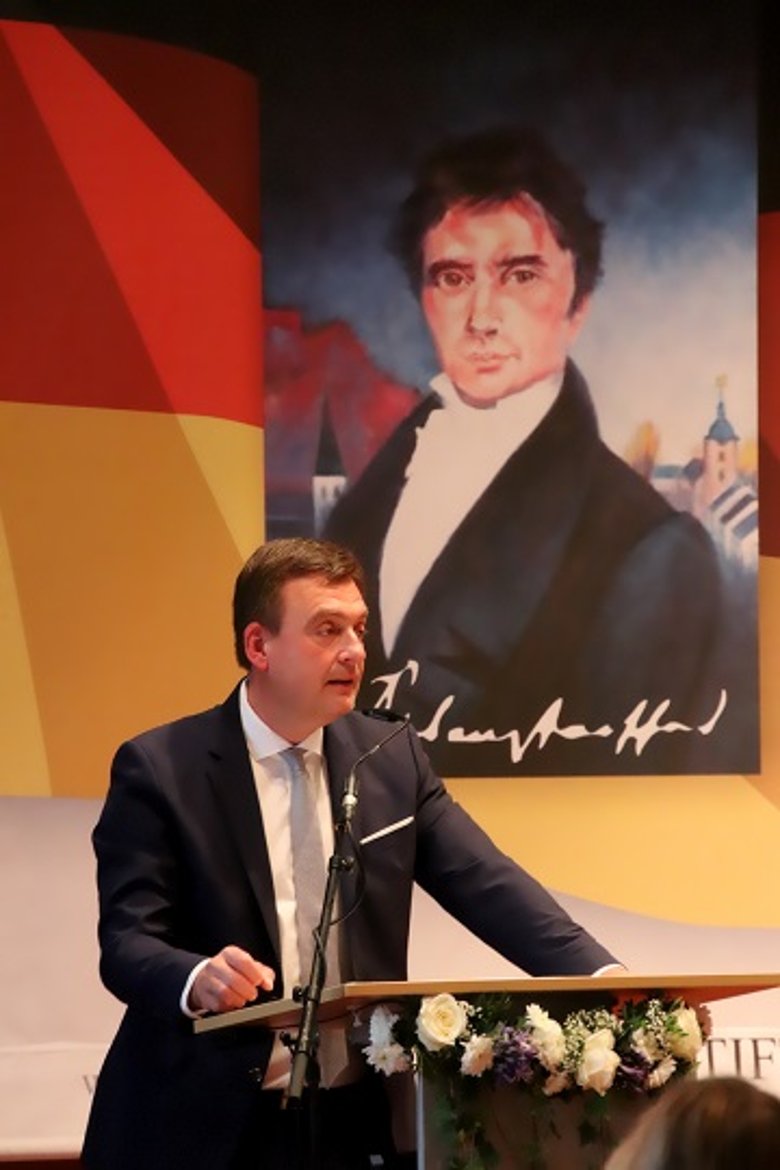The freedom and democracy movement is firmly rooted in the history of the Saarpfalz district. This was also the case with the Siebenpfeiffer Foundation's banquet on 26 January, which commemorated the founding of the Press and Fatherland Association on 29 January 1832 in the Zweibrücken district of Bubenhausen for the 36th time. The large conference hall in the Homburg Forum was attractively decorated for this traditional event. There was huge interest in the run-up to the event, so that a good 200 guests from politics, business and society filled the seats at the festively laid tables. The inviting setting was conducive to a cosy atmosphere right up to the end of the event. Martin Baus, M. A., Managing Director of the Siebenpfeiffer Foundation, and his team of organisers were responsible for this.
District Administrator Dr Theophil Gallo included more than just a thought to carry forward in his speech, which is reserved for the District Administrator as Chairman of the Siebenpfeiffer Foundation at the beginning of the banquet. He recalled the largest demonstration for freedom and democracy in Germany, the Hambach Festival on 27 May 1832, and compared it with the current demonstrations against the shift to the right, which took place in large numbers in Germany last weekend. At the same time, he questioned whether this is enough today if democracy is to be protected. He had clear words for anti-democratic ideas from both the far right and far left, for political representatives who distort historical facts and openly show their hatred for a Germany that is the way they do not want it to be: cosmopolitan, diverse, tolerant, democratic and aware of its past.
Just as clearly and with the following day in mind, Dr Gallo referred to 27 January 80 years ago, when the Auschwitz concentration camp was liberated by the Red Army: "The terrible events of that time are certainly not a 'blip in over 1000 years of successful German history', as a representative of the AfD would have us believe years ago. The contemporary witnesses who experienced and survived this are dying off, in a few years they will no longer exist." This fact, which cannot be changed, is accompanied by a growing number of young people who no longer know the meaning of the terms "Holocaust" or "Shoah". With verifiable findings from studies on this, the district administrator questioned the current education system in part, but not the demonstrably visible endeavours and desire of teachers to place German history, politics and understanding of democracy on a broad basis. "This is one of the reasons why, as District Administrator, I have been visiting schools for around six years with the motto 'District Administrator goes to school' and doing my bit to support the work of the schools in dialogue with young people. This is my mission and part of my municipal responsibility," said the District Administrator.
This communal responsibility also resulted in the invitation to the head teachers of the Geschwister-Scholl-Schule Blieskastel and the Gemeinschaftsschule Neue Sandrennbahn Homburg to take part in the traditional banquet with pupils. Both groups took the opportunity to introduce themselves on stage in front of a larger audience following the trenchant guest lecture by Martin Grasmück, Director of Saarländischer Rundfunk. Her statements countered popular opinions about the disinterest of today's youth in history or political developments. Two clear messages emerged from their statements: "We are grateful to be here. And: We are grateful to be able to learn at a multi-cultural school."
Martin Grasmück, meanwhile, had set himself the task of shedding light on the importance of quality media for democracy, in particular the significance of public service broadcasting. He outlined its beginnings in 1922 with the BBC in London, which became a recognised institution among the population, set journalistic standards and was a model for the organisation and financing of other public broadcasting organisations in Europe. Among other things, Grasmück addressed the need for reform in the public broadcasting system and at the same time its important role in the cohesion of society. The current situation is characterised by targeted influence, the obvious attempt to discredit public service broadcasting by its opponents, the loss of the free press in individual European countries as well as the possibility of its restoration, as is the case in Poland. Last but not least, he denounced the propaganda and targeted disinformation of the population in Russia and China by media controlled from above. "In addition, algorithms on social media platforms and now also artificial intelligence are flooding users with one-sided content, causing many to only look in certain directions, only allow certain opinions and isolate themselves from the diversity of opinion," emphasised the Director-General.
He pleaded passionately in favour of adhering to the basic principles of broadcasting freedom, which in turn was non-negotiable - and the audience applauded as a sign of unreserved approval.
"A strong and modern public service broadcaster in Europe can also be a great opportunity for private players if we stand together in terms of quality and safeguarding democracy and work together where it makes sense and where journalistic independence is not jeopardised," concluded Martin Grasmück.
Finally, the two musicians Ulrike Speich (violin/viola) and Elisa Raber (flute), music teachers at the Homburg Music School, were delighted to receive a hearty round of applause. With Scottish folk melodies, freedom songs and excerpts from Telemann sonatas, they framed the event in a marvellous way. The folk song "Die Gedanken sind frei" (Thoughts are free), to which the audience joined in vigorously, was a traditional finale before the lunch buffet was opened. District Administrator Dr Theophil Gallo thanked everyone who contributed to the success of the event.

Martin Grasmück spoke about "The importance of public service broadcasting for democracy". Photo: Martin Baus
